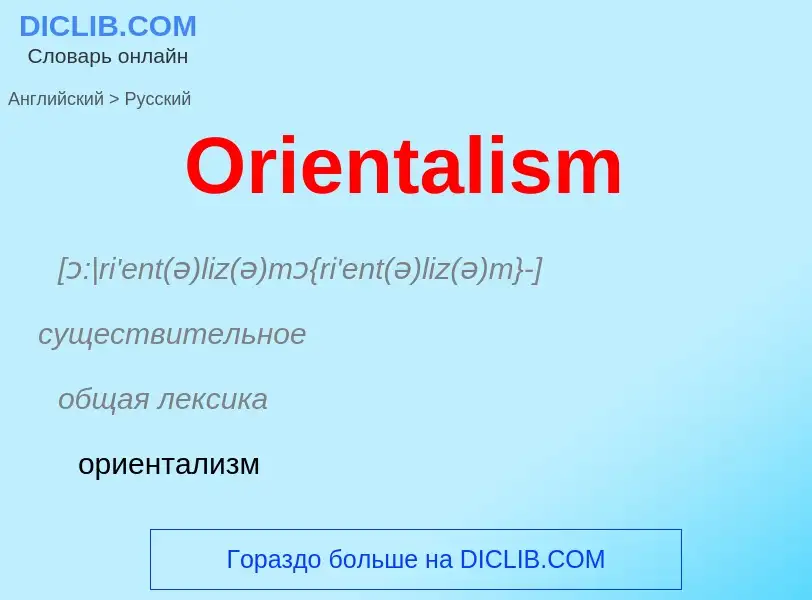Перевод и анализ слов искусственным интеллектом ChatGPT
На этой странице Вы можете получить подробный анализ слова или словосочетания, произведенный с помощью лучшей на сегодняшний день технологии искусственного интеллекта:
- как употребляется слово
- частота употребления
- используется оно чаще в устной или письменной речи
- варианты перевода слова
- примеры употребления (несколько фраз с переводом)
- этимология
Orientalism - перевод на русский
[ɔ:|ri'ent(ə)liz(ə)mɔ{ri'ent(ə)liz(ə)m}-]
существительное
общая лексика
ориентализм
культура
нравы
обычаи
образ жизни или мышления и т. п. восточных народов
ориенталистика
востоковедение
существительное
общая лексика
ориентализм
культура, нравы, обычаи жителей Востока
востоковедение, ориенталистика
Определение
Википедия

In art history, literature and cultural studies, Orientalism is the imitation or depiction of aspects in the Eastern world. These depictions are usually done by writers, designers, and artists from the Western world. In particular, Orientalist painting, depicting more specifically the Middle East, was one of the many specialisms of 19th-century academic art, and the literature of Western countries took a similar interest in Oriental themes.
Since the publication of Edward Said's Orientalism in 1978, much academic discourse has begun to use the term "Orientalism" to refer to a general patronizing Western attitude towards Middle Eastern, Asian, and North African societies. In Said's analysis, the West essentializes these societies as static and undeveloped—thereby fabricating a view of Oriental culture that can be studied, depicted, and reproduced in the service of imperial power. Implicit in this fabrication, writes Said, is the idea that Western society is developed, rational, flexible, and superior. This allows Western imagination to see "Eastern" cultures and people as both alluring and a threat to Western civilization.


![[[Anders Zorn]], ''Man and boy in Algiers'', 1887 [[Anders Zorn]], ''Man and boy in Algiers'', 1887](https://commons.wikimedia.org/wiki/Special:FilePath/Anders Zorn An Algerian man and boy looking across Bay of Algiers.jpg?width=200)
![Costume design for [[Aida]] by [[Auguste Mariette]], 1871 Costume design for [[Aida]] by [[Auguste Mariette]], 1871](https://commons.wikimedia.org/wiki/Special:FilePath/Auguste mariette - croquis pour la première d'Aïda.jpg?width=200)
![David Roberts]], 1838, in ''[[The Holy Land, Syria, Idumea, Arabia, Egypt, and Nubia]]'' David Roberts]], 1838, in ''[[The Holy Land, Syria, Idumea, Arabia, Egypt, and Nubia]]''](https://commons.wikimedia.org/wiki/Special:FilePath/David Roberts Hypaethral Temple Philae.jpg?width=200)
!["A La Place Clichy" - Advertisement for [[oriental rugs]] by [[Eugène Grasset]] "A La Place Clichy" - Advertisement for [[oriental rugs]] by [[Eugène Grasset]]](https://commons.wikimedia.org/wiki/Special:FilePath/Eugène Grasset - A La Place Clichy.jpg?width=200)
![''[[Sultan]] [[Mehmed II]]'', attr. [[Gentile Bellini]], 1480 ''[[Sultan]] [[Mehmed II]]'', attr. [[Gentile Bellini]], 1480](https://commons.wikimedia.org/wiki/Special:FilePath/Gentile Bellini 003.jpg?width=200)
![Finnish]] explorer and orientalist, who was remembered for being one of the first Europeans to study and travel in the Middle East during the 1840s.<ref>''Notes Taken During a Journey Though Part of Northern Arabia in 1848''. Published by the [[Royal Geographical Society]] in 1851. ([https://archive.org/details/jstor-1798039 Online version.])</ref><ref>''Narrative of a Journeys From Cairo to Medina and Mecca by Suez, Arabia, Tawila, Al-Jauf, Jubbe, Hail and Nejd, in 1845'', Royal Geographical Society, 1854.</ref><ref>William R. Mead, ''G. A. Wallin and the Royal Geographical Society'', Studia Orientalia 23, 1958.</ref> Portrait of Wallin by [[R. W. Ekman]], 1853. Finnish]] explorer and orientalist, who was remembered for being one of the first Europeans to study and travel in the Middle East during the 1840s.<ref>''Notes Taken During a Journey Though Part of Northern Arabia in 1848''. Published by the [[Royal Geographical Society]] in 1851. ([https://archive.org/details/jstor-1798039 Online version.])</ref><ref>''Narrative of a Journeys From Cairo to Medina and Mecca by Suez, Arabia, Tawila, Al-Jauf, Jubbe, Hail and Nejd, in 1845'', Royal Geographical Society, 1854.</ref><ref>William R. Mead, ''G. A. Wallin and the Royal Geographical Society'', Studia Orientalia 23, 1958.</ref> Portrait of Wallin by [[R. W. Ekman]], 1853.](https://commons.wikimedia.org/wiki/Special:FilePath/Georg August Wallin (1811-1852), Scandinavian orientalist and explorer.jpg?width=200)
![Photograph of [[Cairo]] by [[Francis Frith]], 1856 Photograph of [[Cairo]] by [[Francis Frith]], 1856](https://commons.wikimedia.org/wiki/Special:FilePath/Kairo 1856 (Francis Frith).jpg?width=200)
![[[Jean Auguste Dominique Ingres]], ''[[The Turkish Bath]]'', 1862 [[Jean Auguste Dominique Ingres]], ''[[The Turkish Bath]]'', 1862](https://commons.wikimedia.org/wiki/Special:FilePath/Le Bain Turc, by Jean Auguste Dominique Ingres, from C2RMF retouched.jpg?width=200)
![[[Léon Cogniet]], ''The 1798 Egyptian Expedition Under the Command of Bonaparte'' (1835; [[Musée du Louvre]]). [[Léon Cogniet]], ''The 1798 Egyptian Expedition Under the Command of Bonaparte'' (1835; [[Musée du Louvre]]).](https://commons.wikimedia.org/wiki/Special:FilePath/Leon Cogniet - L Expedition D Egypte Sous Les Ordres De Bonaparte.jpg?width=200)

![Cover of the pulp magazine ''[[Oriental Stories]]'', Spring 1932 Cover of the pulp magazine ''[[Oriental Stories]]'', Spring 1932](https://commons.wikimedia.org/wiki/Special:FilePath/Oriental Stories Spring 1932.jpg?width=200)
![The Sheik]]'', 1921 The Sheik]]'', 1921](https://commons.wikimedia.org/wiki/Special:FilePath/The Sheik - Rudolph Valentino and Agnes Ayres.jpg?width=200)
![[[William Holman Hunt]], ''A Street Scene in Cairo; The Lantern-Maker's Courtship'', 1854–61 [[William Holman Hunt]], ''A Street Scene in Cairo; The Lantern-Maker's Courtship'', 1854–61](https://commons.wikimedia.org/wiki/Special:FilePath/William Holman Hunt 002.jpg?width=200)



![Egyptian Revival]]: Table, 1775–1780, wood, carved, painted, and partly gilded, and black granite top not original to table, Metropolitan Museum of Art Egyptian Revival]]: Table, 1775–1780, wood, carved, painted, and partly gilded, and black granite top not original to table, Metropolitan Museum of Art](https://commons.wikimedia.org/wiki/Special:FilePath/Table MET DP106721.jpg?width=200)


![Chinese inspiration/Chinoiserie: [[Chinese Tower]] in the [[Englischer Garten]], [[Munich]], Germany, by [[Johann Baptist Lechner]], 1789-1790, reconstructed in 1952 Chinese inspiration/Chinoiserie: [[Chinese Tower]] in the [[Englischer Garten]], [[Munich]], Germany, by [[Johann Baptist Lechner]], 1789-1790, reconstructed in 1952](https://commons.wikimedia.org/wiki/Special:FilePath/2012-07-17 - Landtagsprojekt München - Englischer Garten - Chinesischer-Turm - 7362.jpg?width=200)


![Museum of Decorative Arts]], Paris Museum of Decorative Arts]], Paris](https://commons.wikimedia.org/wiki/Special:FilePath/Cabinet, by Léon Dromard, Paris, circa 1874-1889, pear wood, inv. 2014.3.1 MAD Paris.jpg?width=200)
![Egyptian inspiration/Egyptian Revival: Interior of the Temple maçonnique des Amis philanthropes, [[Brussels]], [[Belgium]], 1877-1879, by [[Adolphe Samyn]], with the help of [[Ernest Hendrickx]], J. De Blois and [[Alban Chambon]] Egyptian inspiration/Egyptian Revival: Interior of the Temple maçonnique des Amis philanthropes, [[Brussels]], [[Belgium]], 1877-1879, by [[Adolphe Samyn]], with the help of [[Ernest Hendrickx]], J. De Blois and [[Alban Chambon]]](https://commons.wikimedia.org/wiki/Special:FilePath/2043-05370 De Grote Tempel van de vrijmetselaarsloge Les Amis Philanthropes.jpg?width=200)
![Nancy]], France Nancy]], France](https://commons.wikimedia.org/wiki/Special:FilePath/Vase Espoir.jpg?width=200)
.jpg?width=200)
.jpg?width=200)

